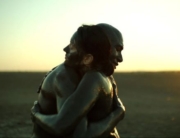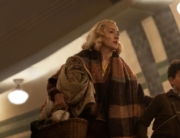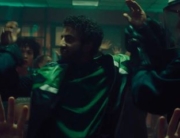The American Civil War pitted brother against brother. When we find the two brothers at the center of Zachary Treitz’s feature debut, they’re already pitted against each other, but the war barely affects their lives. They own some land in Kentucky that’s not reaping them any profits, and it doesn’t help that the elder, Francis (David Maloney), is incompetent at most farming tasks and short-sighted in his thinking. He knows it and takes it out on his younger brother, Henry (Tim Morton), by making him the butt of a bunch of pranks. Henry is sensitive, capable, and marginally more intelligent but unsuccessful at taking control from Francis.
The film really comes alive when the brothers interact with the rest of their small town, where they stick out like sore thumbs. In a town filled with adults, the two seem like they’re playing dress up—an accident involving Francis’s bright idea of throwing an ax winds up with the two trying to find medical assistance. Confirming their outsider status, they discover that nearly everyone else but them has been invited to a party thrown by a well-to-do family with two beautiful daughters, played by Spring Breakers’ Rachel Korine and House of Cards’ Kate Lyn Sheil (who also served as a writer with Treitz and a co-producer on the project). They attend anyway, and the droll party sequence plays like one of the best cringe comedies in recent memory where you are simultaneously laughing at the main characters and wishing they would leave so they can stop embarrassing themselves. Morton and Maloney are pitch-perfect at finding the comedy in the brothers’ naked desires to be accepted.
The historical setting lends the film a unique tone. Treitz and Sheil mainly relegate the war and cultural history to the peripheries—a racist comment from the Southern gentry or the townspeople giving incoming Union soldiers dirty looks. Even when one brother fights in the war, the film keeps to its minimalist nature that fits both the story and the minuscule budget of the film, in which the production designers worked wonders. This doesn’t feel like actors from the New York independent scene playing dress up; it feels like you’re watching the past. Cinematographer Brett Jutkiewicz excels at using the hallmarks of current art-house cinema—the hand-held camera and Terrence Malick–inspired use of natural light—to give the film a sense of immediacy.
About halfway through, the movie shifts and becomes a pair of existential character studies of the brothers after they have become separated. On that front, the movie is marginally less successful. Morton and Maloney continue to be compelling screen presences. And at 98 minutes, the film never wears out its welcome and stays true to its small-scale intentions. However, the charms of the actors and the skill of the filmmaking does not dispel the feeling that the story itself is a little too slight for its own good. The episodes that make up the last third feel hollow and don’t illuminate new aspects of the characters, and the epiphany that ends the movie does not seem too different from an epiphany about an hour earlier, dulling the emotional effect. Still, Men Go to Battle is a well-made, entertaining, and quietly ambitious addition to the current American independent landscape.







Leave A Comment